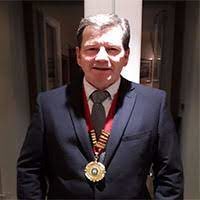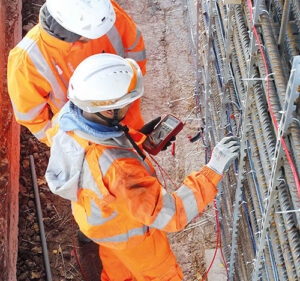The cart is empty!
11 Questions in 11 Minutes
 This month, we have been speaking to Stephen Tate, twice past Chair of the Aberdeen Branch of the Institute of Corrosion and recently elected as the Institute’s Vice President. Here is what he told us about his career to date – plus a couple of little-known facts about his personal life.
This month, we have been speaking to Stephen Tate, twice past Chair of the Aberdeen Branch of the Institute of Corrosion and recently elected as the Institute’s Vice President. Here is what he told us about his career to date – plus a couple of little-known facts about his personal life.
Here are the 11 questions we posed in the 11 minutes we took of Stephen’s valuable time.
1. What did you aspire to be when you were younger?
One of the things l fancied doing at school was joining the RAF and later becoming a pilot. My eyesight let me down on that one, but l did get to fly in my teens as rear passenger in a Tiger Moth.
After that disappointment, I moved onto matters nearer the ground and studied Building and Surveying at Guildford Technical College. There I learned most of the key trades like bricklaying, joinery, and technical drawing; all of which l enjoyed very much, being a practical sort of person.
Later in life l was a member of the Caledonian Self-Build Housing Association in Scotland. There, I could put my knowledge to good use in a team of 30, and I ended up with a 4-bedroom house in Udny Green, near Aberdeen. This was great for our growing family: my wife Eleanor, children Rachel and Christopher, and, of course, our many lovely pets.
2. So, how did you end up as a corrosion specialist?
In the 1970s, l spent quite a few years in the construction industry. This included periods with major organisations such as British Rail and British Airports, working in design departments on interesting projects such as Dover Hoverport and Heathrow re-modelling.
I also spent some time with private architects in Sussex, preparing drawings as an Architectural Technician. Again, I was involved in many interesting projects, including a Cheesery and interiors for the Rudolf Steiner School in Aberdeen.
There was a bit of a slump in the late 70s, but by good chance l picked up some fabrication and QA work in the newly developing oil and gas industry. Consequently, l spent the first part of the 1980s at the BAM HCG Schiedam Shipyard near Rotterdam, where l learned many new skills that have stayed with me for life.
One of many achievements there was that we built and land tested the first major UK North Sea Subsea Template, a 9-well Underwater Manifold Centre (UMC) for Shell Cormorant Field that went on to produce oil for the next 20 years.
3. What was that first job like?
Absolutely fantastic! l had a great Mentor in Dr Marco Fabbri of TRW Ferranti, someone who really believed in me – and living in Holland was marvellous!
In addition to working with Dutch people every day and learning their culture and humour, l learned all about cathodic protection (CP), welding, hydraulic testing, inductive connectors, and subsea control systems. After this l studied Offshore Corrosion and Materials Engineering (OMACE) more formally at Newcastle Polytechnic and then RGU Aberdeen (at that time, RGIT).
On the downside, l distinctly remember the cold weather of the docks and my visits to hospital after falling off some very icy steelwork (HSE was its infancy at that time).
4. You decided to stick with oil and gas. How did your career progress?
After my subsea experiences, l moved into the pipelines and CP industry. I was involved in quite a few new-build projects in Europe and Africa over the next 16 years with ACEL (Aberdeen Corrosion Engineers Ltd.) including the Trans Mediterranean Gas Pipeline, as well as offshore diving projects in the Middle East.
I later completed an MBA with Dissertation in Integrity Management and moved on to work with some major North Sea inspection and verification companies including CAN Offshore, DNV, Oceaneering, and Stork. For a lot of this time, l was seconded to major O&G operators such as British Gas, ConocoPhillips, Shell, and Talisman Energy, working in both upstream and downstream operations in the North Sea and Middle East.
Since 2016 l have been kept very busy assisting the operations and projects teams at Total E&P, a role that l enjoy very much under the leadership of Dr David Hillis, a very capable metallurgist.
5. What have you enjoyed most about your career in corrosion?
The variety of technologies, locations, people, and cultures that l have been fortunate to learn from and witnessing some extremely difficult projects come to fruition. Total, (soon to be TotalEnergies in the new world of renewables) is very much a global company with many interesting activities.
6. What career advice would you give to a young corrosion specialist?
Don’t lock yourself in the office.
You need to spend a lot of time at the coalface, learning what works and what doesn’t. P&IDs only really mean something when you see them in the flesh and can see them being played out in the control room with all the active alarms in operation.
7. What is in store for corrosion professionals?
A great future. Corrosion professionals and their expertise will always be required across many industries. Ensuring corrosion control is considered at all stages of the lifecycle is an integral part of project planning and giving added value to the end user.
If anything, it is even more relevant now, as many companies try to balance both ageing assets and diversification (with new corrosion issues of the renewables sector and impacts of climate change on temperature and humidity). We all have an important role to play in sharing our knowledge on these matters.
8. What have you gained from your membership of ICorr?
Just being a member alone is not enough. To get the full benefits of our very unique institution you must become actively involved in it. The networking opportunities, knowledge, and experiences of the ICorr branches are enormous.
Having spent nearly 10 years recently on the Aberdeen Committee, I have first-hand experience of how important ICorr is to local industry – and how respected it is as an organisation. ICorr, although growing every day, is still small enough to care and is primarily a Charity, not a business!
Finally, ICorr has brought me many new friends and opportunities and has been a big part of my life.
Let’s get personal with the corrosion professional!
We know that corrosion scientists aren’t all work and no play, so we asked Stephen three final questions to learn a little more about him personally.
9. What’s your favourite food?
Definitely Indian. A good flavoursome curry like a Rogan Josh.
However, for UK food, roast lamb always hits the nail for me. Maybe because it reminds me of my parents (both now sadly passed). When l was a child, we often had a nice Sunday Roast after going to Church and Sunday School. That was our reward for good behaviour, l guess.
10. What do you like doing most outside of your professional life?
I do like my trees, especially the fabulous Fagus Sylvatica ‘Purpurea’. Over the years, I have acquired several acres of former Forestry Commission land that l manage near our house in rural Aberdeenshire close to the River Ythan. At the weekends l might be seen driving my JCB 3CX or Takeuchi mini digger.
I also enjoy designing and landscaping gardens, and have done quite a few projects for my colleagues in the oil and gas industry.
I collect artwork, too. Mainly watercolours by local Scottish artists, such as harbour and coastal scenes. My favourite local artist is Kanita Sim (you can find her work online at Scottish Scene and Kanita Sim Art).
11. Tell us a secret about yourself, something that might surprise fellow members (and something we can print!)
You could say l am a bit of a Beatles fanatic – I have been since the 60s. They were such an extremely talented band.
l once owned a Beatles jacket, and I saw all their movies at the local Odeon. I went inside Abbey Road Studios a few years back, and I’ve been fortunate to see Paul McCartney in concert several times.
What do you want to ask a corrosion specialist?
Family. Trees. Art. Music. Indian food. The perfect foil for the intensity of life as a corrosion specialist. Yet it may have been so different. If Stephen had been blessed with 20/20 vision, he could have had a career in the skies – though we think you’ll agree that his work has taken him to the highest levels.
Like so many other members of ICorr, Stephen has enjoyed a career that has delivered huge variety of work and, aided by his involvement with the Institute of Corrosion, a network of professional colleagues and friends around the world.
Now, over to you. Let us know what you’d like us to ask the next ICorr member we put in the hotseat for 11 questions in 11 minutes. Send us an email, and we’ll try to include your question.

